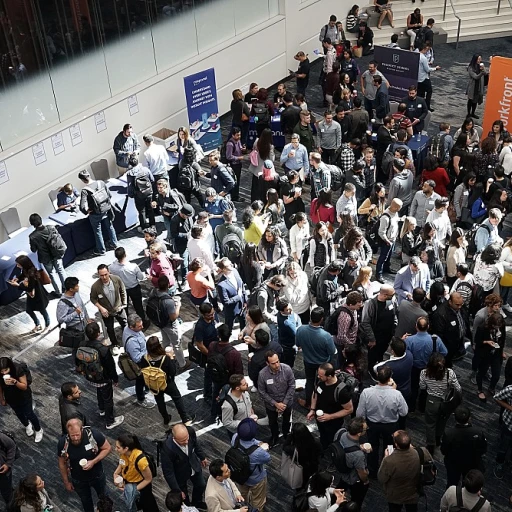Understanding AI's Role in Modern Workplaces
Embracing Transformation Through AI
In today's fast-paced business environment, artificial intelligence (AI) is redefining how companies approach work. By integrating AI into modern workplaces, organizations can enhance their operational efficiency and gain a competitive advantage. The advent of AI in the workplace is not just about adopting a new technology; it's about revolutionizing business processes and reshaping our understanding of work.
AI takes on various roles, depending on the industry and business function. One prominent example is its integration into customer service, where AI agents handle repetitive tasks like answering common queries, thus freeing human agents to focus on more complex customer interactions. This trend towards AI for routine tasks minimizes human error and allows for real-time decision making, increasing efficiency across the board.
Moreover, AI is instrumental in processing vast amounts of unstructured data. Machine learning algorithms sift through data to identify patterns that may not be immediately apparent to humans, thereby providing data-driven insights that businesses can leverage for better decision making. This capability not only improves productivity but also helps in personalizing customer experiences, enhancing overall customer satisfaction.
At the same time, AI poses challenges such as data privacy concerns and the potential for job displacement. As more tasks become automated, companies must navigate the complexities of a changing workforce. Ethical considerations must be addressed, including the establishment of a robust privacy policy and ensuring transparency in AI-driven decisions.
Success stories continue to emerge from companies effectively integrating AI into their operations. For those ready to embark on this journey, understanding the core role of AI in modern workplaces is crucial. Businesses can thrive by identifying the specific advantages AI offers and strategically implementing it to augment human capabilities.
Curious to see how companies are tracking their AI integration projects? Explore more on the progress of AI integration projects.
Key Advantages of AI in Work Tech
The Advantages of Artificial Intelligence in Modern Business
The implementation of Artificial Intelligence (AI) in work tech offers numerous advantages that are transforming business processes. AI's ability to handle vast amounts of data plays a vital role in making informed decisions efficiently. By reducing human error, AI enhances decision making and optimizes operations.
An excellent example is incorporating machine learning algorithms in customer service. AI-driven agents can address customer queries in real time, offering a seamless experience while freeing up human agents to focus on more complex issues.
Moreover, AI assists in automating repetitive tasks, allowing employees to focus on strategic initiatives. This automation not only leads to increased productivity but also saves valuable time, providing a competitive advantage to businesses.
AI also excels at analyzing unstructured data, extracting insights that are often missed by traditional methods. Businesses can harness these insights to tailor their strategies, ensuring they remain data-driven and relevant in today’s market.
In industries like supply chain management, AI enhances business processes by predicting demand and optimizing inventory management. The ability to process personal data effectively, while adhering to strict privacy policies, enhances customer trust and loyalty.
While there are concerns about job displacement, AI creates new opportunities in talent acquisition by identifying the right talent for specific roles, ensuring the workforce is aligned with business goals. Organizations embracing AI technology are better positioned for future success and can leverage the potential of AI to drive innovation forward.
AI and Employee Experience
Transforming Employee Interaction and Experience
Artificial intelligence is revolutionizing the way employees engage with their work, creating an environment where both efficiency and satisfaction are enhanced. Data-driven insights derived from AI tools are instrumental in reshaping the workplace dynamics by optimizing business processes and reducing the burden of repetitive tasks. This shift allows employees to focus on more strategic and creative functions, ultimately driving a meaningful work experience.
AI systems are adept at processing large volumes of unstructured data, ensuring that employees have real-time information and insights at their fingertips. This capability enhances decision making, reducing the probability of human error and improving overall productivity. For instance, in roles such as customer service or talent acquisition, AI can help agents by analyzing trends and providing solutions tailored to individual customer needs, providing a competitive advantage for businesses.
The integration of machine learning and artificial intelligence in everyday workplace operations isn't just about efficiency; it's about transforming the employee experience by facilitating tasks that are both time-consuming and tedious. Employees now have the opportunity to engage in projects that align more closely with their skills and interests, while AI manages the laborious elements. This human-centric approach not only improves job satisfaction but also boosts innovation within companies.
Despite these advantages, the incorporation of AI into the workplace does come with challenges, particularly concerning job displacement. There's a need to address privacy concerns related to the handling of personal data and implementing robust privacy policies. Companies must navigate these ethical considerations carefully as they continue to leverage the benefits AI offers to improve business and employee outcomes.
Challenges and Ethical Considerations
Addressing Concerns: Navigating the Challenges with AI Integration
In the quest to embrace artificial intelligence within workplaces, businesses must navigate a range of challenges and ethical considerations. As companies tap into AI's potential, they encounter hurdles stemming from both the technological and human fronts.
One notable challenge is dealing with unstructured data. While AI and machine learning excel with structured inputs, the industry's tendency to generate vast amounts of unstructured data demands innovative solutions. Effective tools and systems that transform this data into actionable insights are essential for maintaining a competitive advantage.
Personal data also presents a significant concern. Crafting a robust privacy policy becomes crucial when AI involves sensitive information, especially in customer service or talent acquisition processes. Ensuring high standards for data privacy and transparency can help companies build trust with both employees and clients.
Additionally, the use of AI in decision making may lead to job displacement, as repetitive tasks previously handled by human agents could become obsolete. It's imperative for businesses to balance the efficiency benefits AI offers with the necessity of retraining and upskilling employees to perform more value-added roles.
While AI reduces human error and optimizes business processes, there's a risk of relying too heavily on technology for critical decision making, especially in cases like driving cars or risk assessment in supply chains. In these areas, maintaining a human in the loop can prevent decisions that might stem from the disadvantages artificial intelligence could bring.
Ethical considerations also extend to ensuring that AI does not reinforce biases or perpetuate existing inequalities. Companies should strive to adopt fair machine learning models that are both data driven and continuously refined for accuracy and fairness.
As businesses harness AI's potential, it's essential they approach this transformation with mindfulness towards the broader social and ethical implications, paving the way for a responsible and inclusive future.
Case Studies: Successful AI Integration
Real Success Stories with AI Integration
In the ever-evolving landscape of work tech, numerous companies have successfully integrated artificial intelligence to streamline operations, enhance customer service, and drive better decision-making processes. These successes highlight the tangible benefits that AI offers, despite the challenges associated with its deployment.
One prominent example of AI integration comes from the retail sector, where companies are leveraging data-driven insights to personalize shopping experiences and optimize supply chain management. This use of data allows for more efficient tracking and real-time adjustments to inventory levels, minimizing human error and ensuring that products meet customer demands promptly.
In the realm of customer service, AI-powered chatbots and virtual agents have revolutionized how businesses interact with their clients. These intelligent systems handle repetitive tasks efficiently, freeing up human agents to focus on more complex customer inquiries. As a result, businesses gain a competitive advantage by providing faster and more accurate responses to customer concerns.
The transportation industry has also experienced transformations with AI's entry. Companies using machine learning in driving cars exhibit significant reductions in human error, promising safer alternatives for commuters. Furthermore, AI models that process vast amounts of unstructured data are contributing to improved decision-making regarding traffic management and route optimization.
In the field of talent acquisition, the recruiting processes are enhanced with AI's ability to analyze candidate data, helping organizations select the best-fit candidates in considerably less time. This not only speeds up hiring but also aligns with business strategies more effectively, thus tapping into the full potential of human resources while addressing job displacement concerns.
However, while these advancements showcase the benefits artificial intelligence brings to the table, it's important to recognize the associated disadvantages. Ethical considerations such as the handling of personal data and privacy policies continue to be pressing issues that require vigilant oversight.
Overall, these case studies underscore the real-world benefits and challenges of integrating AI into business processes. As companies continue to navigate the complexities of AI adoption, the insights gained from these examples can serve as a guide for future strategic planning and decision-making.
Future Trends in AI and Work Tech
AI as the Strategic Transformative Force
Artificial intelligence is paving the way for transformative changes in the workplace, driving innovation and efficiency across industries. With the constant evolution of technology, companies can expect to see AI playing an even more integral role in the future.
Machine Learning and Business Process Automation
Machine learning algorithms allow companies to analyze large sets of unstructured data in real time, revealing valuable insights that propel strategic decision-making. By automating repetitive tasks, businesses can focus on more value-driven activities and deliver a superior customer service experience. This data-driven approach will continue to shape business processes and redefine traditional roles.
AI in Talent Acquisition and Workforce Management
Talent acquisition is another area where AI is impacting the way companies operate. Predictive analytics help identify and attract the best candidates, while smart algorithms can drastically reduce human error in screening processes. As artificial intelligence advances, its potential to manage and optimize workforce efficiency will stretch further, potentially even reducing job displacement concerns as new roles emerge.
Enhanced Customer Interaction with AI Agents
AI-driven customer service agents are becoming more sophisticated, providing businesses with a competitive advantage. These smart agents are capable of handling customer queries with precision, allowing human agents to tackle more complex issues. The continuous learning capabilities of AI ensures that customer interaction is seamless and personalized.
Privacy and Ethical Challenges
As AI continues to impact the workplace, challenges around personal data and privacy policy complexities will need addressing. Ethical considerations about data usage, potential disadvantages artificial, and transparency in AI interactions must also be part of the conversation. Companies will need to balance innovation with respect for user privacy and ethical data management.
New Horizons in AI-Driven Workplaces
Future trends suggest AI will transform industries like the automotive sector, particularly in the development of self-driving cars. Similarly, supply chain optimization powered by AI provides businesses with the quick adaptability required in modern markets. The advantages artificial intelligence offers, from reducing inefficiencies to enabling real-time decision making, will undoubtedly define the future work landscape, ensuring businesses that adapt will thrive in an increasingly competitive environment.
For more details and insights on future AI trends, visit the Work Tech Institute’s blog.












